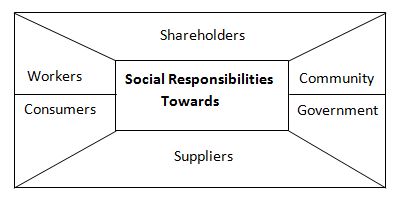Areas of Corporate Social Responsibilities
Social responsibilities toward different stakeholders
Introduction
The scope of social responsibilities of business is very wide. The responsibility is manifold and extends to all those who have a stake in business.
To be specific, the management of a business enterprise is responsible to:
- The inside group consisting of shareholders and employees, and
- The outside group consisting customer supplies, govt. and the community at large.
Shareholders
The just foremost responsibilities of business are to self i.e. to surve and grow. In non – corporate enterprises it implies responsibility to owners. In a company, shareholders are the legal owner, but they are entitled to appoint directors and regulate their activities.
Social responsibilities to shareholders or owners include:
- A fair and regular return on investment in the form dividends.
- An adequate reward for the risk taken in the form of security and appreciation of capital so that the company can attract new capital from the market.
- Full and regular and accurate information on the progress and financial position of the company.
- Reasonable representation and participation of minority shareholders so as to ensure democratic management of corporate affairs.
This also includes responsibilities to debenture holders and other company.
Workers
The second group to which a business enterprise owes an obligation consists of those working in it. Such responsibility consists of:
- Fair wages or salary for the contribution made.
- Security of employment under proper and safe working condition.
- Participation in decisions affecting their working life through union representatives.
- Opportunity for personal advancement through education, training and experience.
- Share in the increasing prosperity of business through bonus etc.
- Meaningful work that provides job satisfaction, freedom and human treatment.
Consumers
Consumer is the foundation of business and satisfaction of consumer is the raison deter of business activities. This implies nuch more than the supply of goods and services. Unfair practices like hoarding, adulteration, shoddy merchandize, unfair measurement, misleading advertising etc. reveal that many business firms fail to fulfill their obligations to consumers.
Suppliers
Every business concern owes an obligation to deal with its suppliers, dealers and competitors in a judicious manner. In order to develop healthy relations with suppliers, it is necessary to be honest and courteous with them. All dealings with supplies should be based on fair terms and conditions regarding prices, quality, delivery of goods, payment etc. undercutting and other unfair practices to exploit small and weak competitions should be avoided.
Government
Modern business is subject to several laws and regulations. If is the responsibility of management to conduct the affairs of the enterprise in accordance with the letter and spirit of law. Business must pay faxes and other dues to the govt. honesty, fully and promptly. In addition, business should help in establishing a democratic an socialistic society.
Community
Business is expected to act only as an instrument of economic growth but also of social progress. Business must utilize the national resources efficiently and effectively for the satisfaction of society’s weeds. As a good citizen, an enterprise should strengthen the culture and cohesion of the society. It is directly responsible for the development of local amenities in the town in which it functions. Every business firm is responsible for maintaining a healthy environment free from all types of pollution in the surrounding area. It can contribute to the well – being of local health, housing etc. it can help society by providing them equal opportunities for growth. Business men fulfill their responsibility to community or the public when they so manage their firms as to make the public good the private good of the enterprise.

